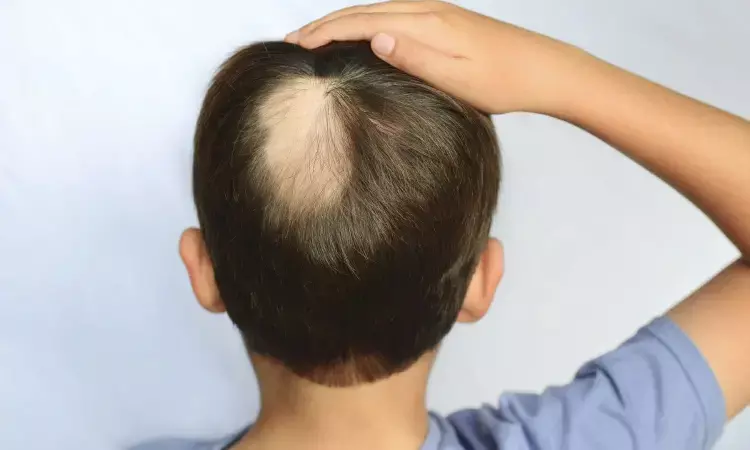- Home
- Medical news & Guidelines
- Anesthesiology
- Cardiology and CTVS
- Critical Care
- Dentistry
- Dermatology
- Diabetes and Endocrinology
- ENT
- Gastroenterology
- Medicine
- Nephrology
- Neurology
- Obstretics-Gynaecology
- Oncology
- Ophthalmology
- Orthopaedics
- Pediatrics-Neonatology
- Psychiatry
- Pulmonology
- Radiology
- Surgery
- Urology
- Laboratory Medicine
- Diet
- Nursing
- Paramedical
- Physiotherapy
- Health news
- Fact Check
- Bone Health Fact Check
- Brain Health Fact Check
- Cancer Related Fact Check
- Child Care Fact Check
- Dental and oral health fact check
- Diabetes and metabolic health fact check
- Diet and Nutrition Fact Check
- Eye and ENT Care Fact Check
- Fitness fact check
- Gut health fact check
- Heart health fact check
- Kidney health fact check
- Medical education fact check
- Men's health fact check
- Respiratory fact check
- Skin and hair care fact check
- Vaccine and Immunization fact check
- Women's health fact check
- AYUSH
- State News
- Andaman and Nicobar Islands
- Andhra Pradesh
- Arunachal Pradesh
- Assam
- Bihar
- Chandigarh
- Chattisgarh
- Dadra and Nagar Haveli
- Daman and Diu
- Delhi
- Goa
- Gujarat
- Haryana
- Himachal Pradesh
- Jammu & Kashmir
- Jharkhand
- Karnataka
- Kerala
- Ladakh
- Lakshadweep
- Madhya Pradesh
- Maharashtra
- Manipur
- Meghalaya
- Mizoram
- Nagaland
- Odisha
- Puducherry
- Punjab
- Rajasthan
- Sikkim
- Tamil Nadu
- Telangana
- Tripura
- Uttar Pradesh
- Uttrakhand
- West Bengal
- Medical Education
- Industry
Oral tofacitinib, novel alternative treatment for resistant alopecia areata among children

China: New research has demonstrated the safety and effectiveness of oral tofacitinib as a treatment option for pediatric alopecia areata (AA), particularly for children who have failed to respond to traditional or are not suitable for such treatments. The findings were published online in Acta Dermato-Venereologica in the September 2023 issue.
Alopecia areata is an autoimmune hair loss condition that affects people of all ages. AA is a common cause of hair loss in children; approximately half of reported cases occur before the age of 20 years. The psychological impact of AA on children can be owing to its recurrent and persistent nature and can lead to a reduced quality of life. Early intervention is important, as early onset and prolonged disease duration can lead to poor treatment response.
Several therapeutic options are available for pediatric AA, despite this, none are both safe and effective. Recent studies have reported the safety and efficacy of the Janus kinase (JAK) inhibitor tofacitinib in adult patients with AA, whereas data is limited on pediatric patients with alopecia areata in real-world practice.
Jundong Huang, Central South University, Hu Nan Key Laboratory of Aging Biology, Changsha, China, and colleagues therefore aimed to evaluate the effectiveness of tofacitinib in pre-adolescent alopecia areata in a single-centre, retrospective study. The study included 11 pre-adolescent patients with AA treated with tofacitinib between 2021 and 2022. The researchers evaluated the clinical characteristics of patients, adverse events, and clinical responses.
The study reported the following findings:
- 82% of patients experienced hair regrowth and 64% of patients experienced over 50% improvement in their Severity of Alopecia Tool (SALT) scores.
- Adverse events were mild. In the literature, tofacitinib has been used to treat AA in 31 children ≤12 years of age who failed to respond to prior treatments.
- Eighty-seven per cent of these patients showed significant responses based on changes in their SALT scores.
"This retrospective case series shows that oral tofacitinib for the treatment of pediatric alopecia areata has significant clinical safety and efficacy, providing a novel alternative for children with AA who do not respond to, or cannot tolerate traditional treatment," the researchers wrote.
"There is a need for further clinical trials and studies to assess tofacitinib's long-term safety in children, and the biomarkers of therapeutic efficacy," they concluded.
The study's limitations include its retrospective nature, a small sample size, a short follow-up period, and a lack of control. However, the authors claim that the current results supplement the knowledge gap in pediatric AA treatment and provide data to guide the choice of systemic therapy.
Reference:
Huang, J., Li, T., Tan, Z., Tang, Y., Li, J., Liu, F., & Shi, W. . (2023). Effectiveness of Tofacitinib in Pre-adolescent Alopecia Areata: A Retrospective Case Series and Literature Review. Acta Dermato-Venereologica, 103, adv13418. https://doi.org/10.2340/actadv.v103.13418
Dr Kamal Kant Kohli-MBBS, DTCD- a chest specialist with more than 30 years of practice and a flair for writing clinical articles, Dr Kamal Kant Kohli joined Medical Dialogues as a Chief Editor of Medical News. Besides writing articles, as an editor, he proofreads and verifies all the medical content published on Medical Dialogues including those coming from journals, studies,medical conferences,guidelines etc. Email: drkohli@medicaldialogues.in. Contact no. 011-43720751


